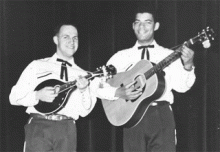Portland, Maine, 1947. Two teenagers, one white, one black, rummaged through the record bins at Knight’s Used Furniture store.
The two didn’t know each other, but they scavenged for the same music: Mostly harmony-rich records of duos from the south. Back then it was frequently called “hillbilly music,” and it often arrived in Portland via military personnel who had traveled from southern homes to their Maine station. When recruits were called overseas, they’d often sell their 78 RPM hillbilly records to Knight’s for 15 cents apiece, and the store would sell them to kids like Al Hawkes and Alton Myers for 25 cents each.
But there weren’t a lot of kids like Hawkes and Myers, searching for the plaintive sounds of the rural south, up in Maine. The fact they were of different races seemed less important than their similar taste in music.
